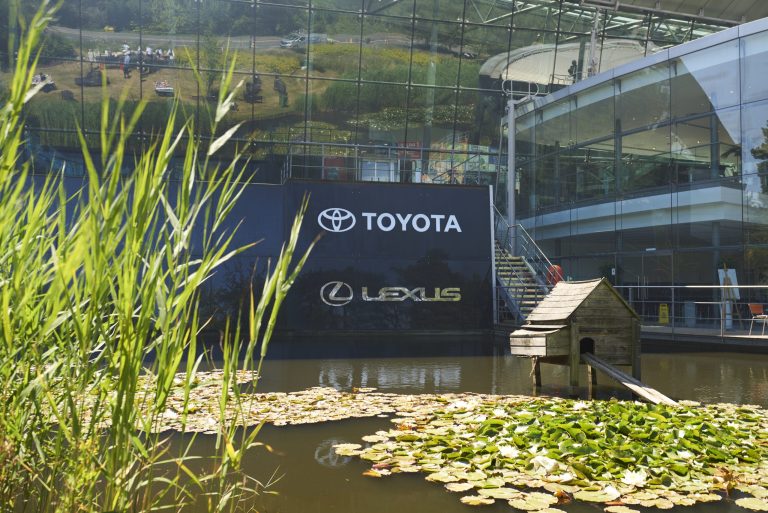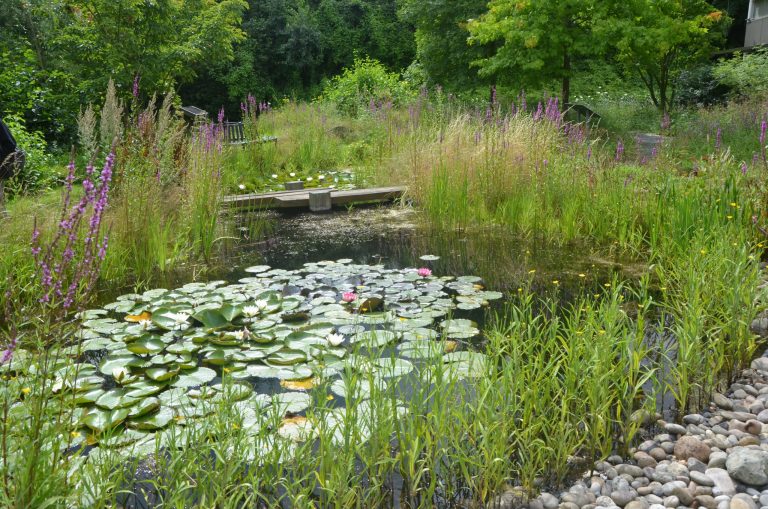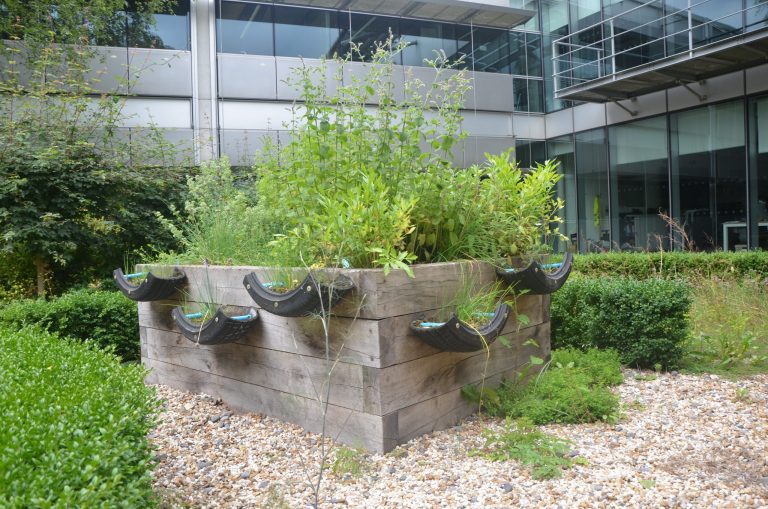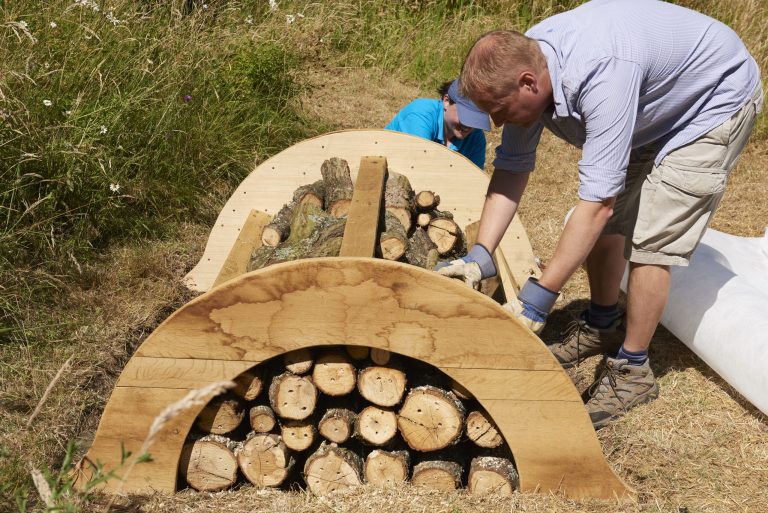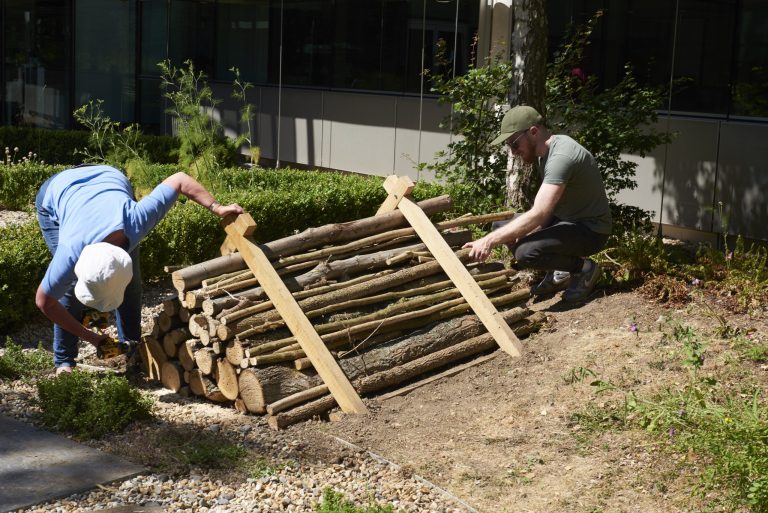Toyota (GB)’s Surrey Headquarters awarded The Wildlife Trusts’ Biodiversity Benchmark
Toyota (GB)’s consistent development of its Surrey headquarters into a haven for plants and wildlife has been rewarded with a fourth Biodiversity Benchmark for land management from The Wildlife Trusts.
The accreditation was awarded because of the high standards of nature enhancement and protection achieved at Toyota’s 14-acre/five-hectare headquarters near Epsom, Surrey. Annual surveys of wildlife and habitats are undertaken by Surrey Wildlife Trust which also provides expert advice to the site’s land management team.
The grounds contain a mix of lawned areas linked by paths and trails, interspersed with ponds, orchards and wooded areas, which staff can enjoy on their breaks. They are maintained by local company, Nurture Landscapes, and by Toyota staff volunteers who have been championing wildlife for years, for example, by making bat boxes and bug hotels, and planting up recycled tyres and raised vegetable beds.
The accreditation certifies the management of a company’s grounds for continual nature enhancement and protection – and complements ISO14001, the international standard for environmental management systems. Toyota GB is one of only 15 UK companies that currently hold this challenging award for land management.
Surrey Wildlife Trust’s Survey results:
- Bat activity in Toyota’s Eco-HQ has increased by 180% since 2018. The diversity of bats has doubled and now includes common pipistrelle, noctule, mouse-eared and long-eared bats. This increase has been achieved after Toyota installed log piles to encourage insects for bats to feed on, and 11 bat boxes. This is great news given that four of the UK’s 17 breeding bat species are at risk of extinction.
- Thirteen butterfly species have been recorded, representing a steady increase since 2019. Most common species observed include the gatekeeper and meadow brown; rarer species include the common blue, marbled white, and ringlet. A peacock butterfly was recorded for the first-time last year, as was a silver-washed fritillary –whose presence indicates positive woodland and scrub management.
- A total of 38 other pollinator species were recorded, a figure which has stabilised after a drop in 2022 due to the prolonged heatwave that year. White/buff-tailed bumblebees were the most abundant, followed by the red-tailed and common carder bumblebees.
- Across the board, the diversity of pollinators has increased. Several less common pollinator species were recorded for the first time, including sharp-collared furrow bees, the early epistrophe hoverfly, jersey tiger, narcissus bulb fly, oxeye daisy, picture-winged fly and yellow-winged mining bees.
Commenting on the Biodiversity Benchmark award, Scott Thompson, Toyota (GB) President and Managing Director said: “This award is a huge credit to everyone who has helped us create a beautiful environment that benefits both our staff and the wildlife that share the green space with us. I’d like to thank Surrey Wildlife Trust for their advice and support in helping us continuously improve and enhance the biodiversity at our Eco-HQ.”
Emma Price Thomas, Head of Corporate Partnerships at The Wildlife Trusts said: “I am delighted that Toyota has maintained Biodiversity Benchmark certification again at its head office site in Surrey.
Seeing a 180% increase in the abundance of bats shows that wildlife across the grounds is flourishing. This is testament to the hard work of Toyota GB’s HQ and its employees’ commitment to protecting and improving the nature of the site.
We look forward to Toyota GB’s HQ continuing to care for its land to benefit wildlife and maintaining The Wildlife Trusts’ Biodiversity Benchmark at the site each year and for the long-term future.”
Developing an eco-friendly headquarters helps fulfil Toyota’s commitment to building a better world, underlined by its Environmental Challenge 2050, in which the company aims to achieve carbon neutrality at a global level by 2050, and in Europe by 2040.
ENDS
Notes to Editors
Biodiversity Benchmark: www.biodiversitybenchmark.org
The Wildlife Trusts have created the Biodiversity Benchmark to encourage organisations to manage their land for wildlife and is the first scheme to recognise continual biodiversity improvement of land. The Benchmark is flexible and adaptable, so that it can be applied to any organisation which manages land, from businesses through to local authorities, service utilities, developers and charities. The Wildlife Trusts’ Biodiversity Benchmark is designed to recognise biodiversity improvements on an organisation’s landholdings; it is not an endorsement of an organisation’s activities or a measurement of its broader environmental performance or impacts.

